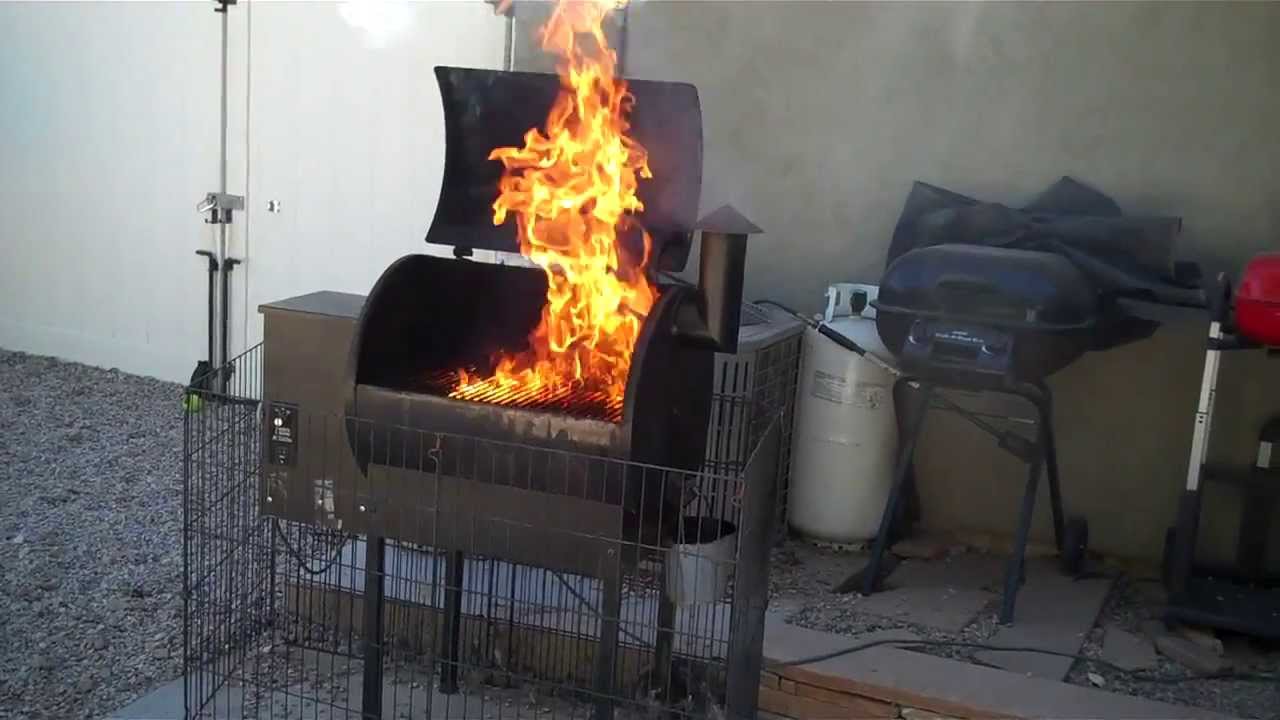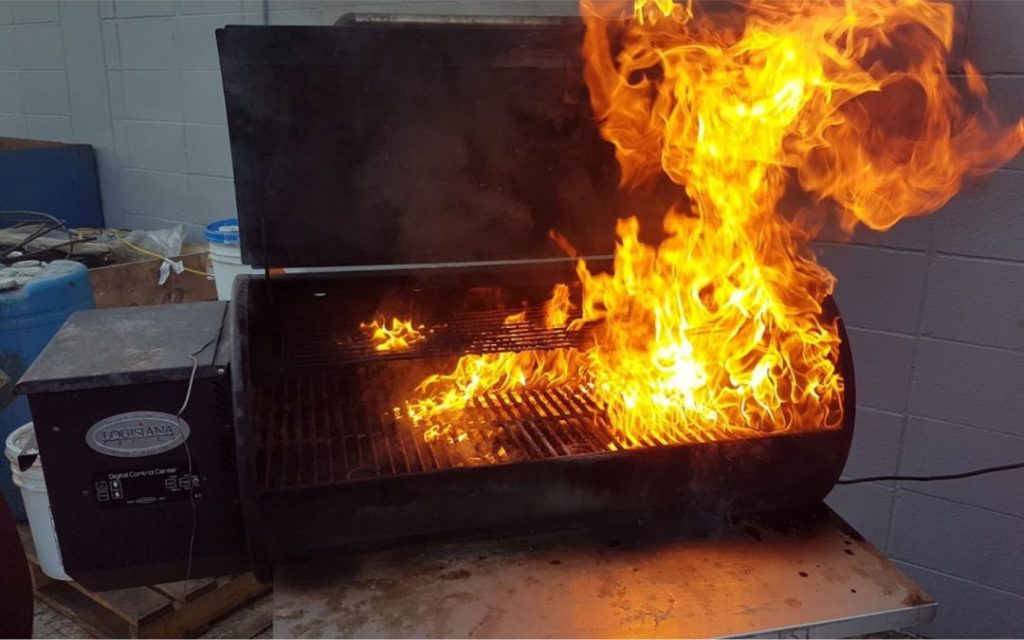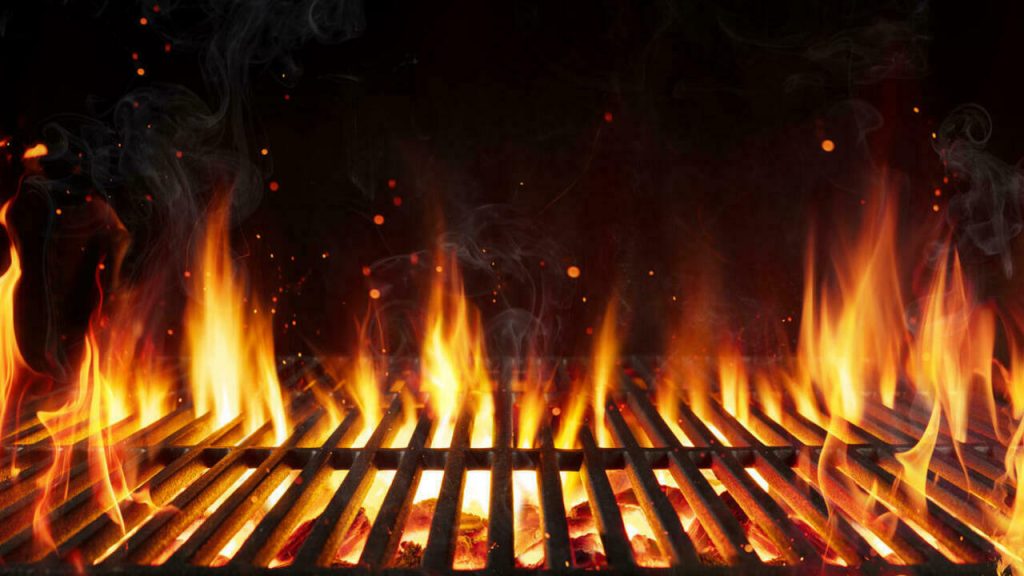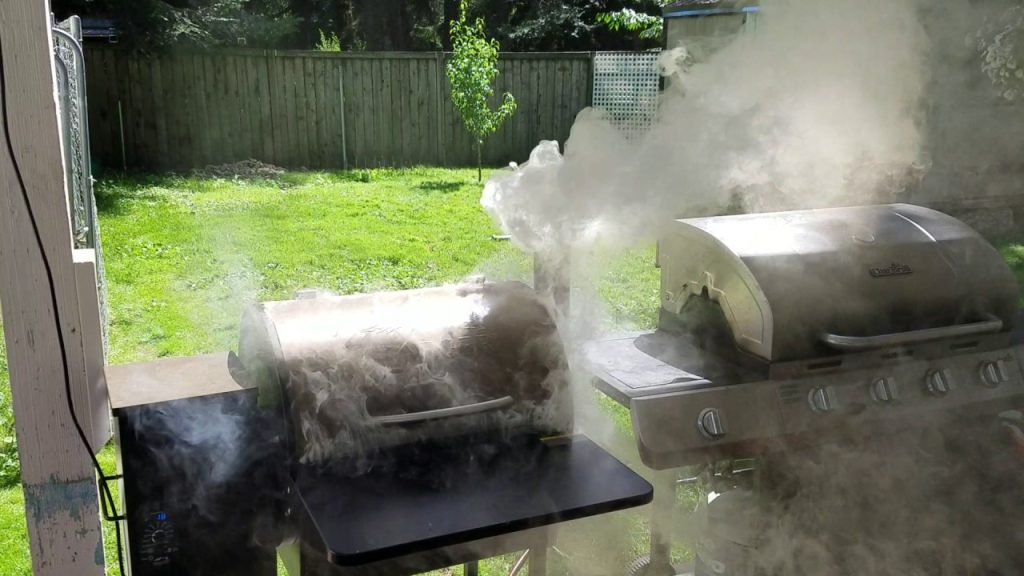What Caused the Fire in My Traeger Grill? Can It Explode?

Pellet barbecues, such as those made by Traeger, appear to be relatively safe. If you’re new to using your Traeger, or even if you’ve been using it for a while, you might be wondering if it can catch fire and if it has, why did my Traeger catch fire.
I have one, but I did some research and discovered the following:
Traeger pellet grills might catch fire if there are too many pellets in the firepot or too much grease in the drip tray. Keep your pellets dry since moisture might cause them to clump and feed poorly through the auger and firepot. Also, use a drip tray liner and replace it every 1-3 cooks.
But there’s a lot more to learn about the cause of your Traeger’s fire.
Continue reading!
Is it possible for a pellet grill to catch fire?

The short answer is yes. Pellet grills, like other grills, use fire to cook food. There is always a risk of fire when there is a fire involved. And a minor flare-up caused by a highly coated grease tray is probably not worth getting worked up about.
You can do a few things if your pellet grill catches fire. With these pointers, you can not only figure out what’s causing the problem but also prevent it from happening again.
However, I would only take these precautions if the fire appears to be dangerous and out of control. Because you won’t be able to resume grilling once you’ve completed these procedures rapidly, first and foremost, ensure that you’re running your pellet grill according to the manufacturer’s instructions.
So, if your Traeger catches fire, what do you do?
RESIST THE TEMPTATION TO FREAK OUT
We don’t think clearly when we’re panicked. When we cannot think clearly, we make poor decisions that may be hazardous to ourselves and others.
Also, if you’re among others and you begin to panic, they may begin to panic as well.
HOPPER AND CLOSE THE LID TO THE GRILL
If the grill and hopper are closed, the fire will be deprived of oxygen, and the flame will go out if there isn’t enough oxygen.
MOVE THE GRILL AWAY FROM ANY FLAMMABLE OBJECTS OR WALLS
Avoid injuring yourself by attempting to move it. If the grill cannot be moved, remove everything that could cause a fire hazard. As instructed, I keep my Traeger 18 inches away from my house’s back wall.
TURN OFF THE GRILL
You don’t want your grill fire to become an electrical fire. So unplug your Traeger and turn off the power switch (don’t worry about the shutdown cycle for now).
DO NOT SPRAY WITH WATER
Throwing water on a burning object appears to be a natural reaction. However, with pellet grills, this is a bad idea for two reasons:
- This electrical appliance could be permanently damaged if it gets wet.
- When you pour water on a grease fire, the flaming oil splatters and splashes, and this only adds to the flames, not extinguishes them.
A fire extinguisher is your best bet if the fire appears to be out of control. However, cleaning up after your Traeger will be time-consuming. And whatever food is left on the grill will have to be discarded.
Is there a flame on a Traeger, or does it ever flare-up?

Yes. An open flame generates the heat in a Traeger. However, unlike a gas or charcoal barbecue, Traeger grills are engineered to prevent flare-ups. That’s because your grates are separated from the flame by a solid metal tray.
As a result, a flame should never be seen in your Traeger.
Pellet grills are therefore more akin to convection ovens than regular grills. Traegers use wood pellets as a heat source instead of electricity or natural gas. Despite the fact that Traeger grills use wood pellets, they are not classified as wood grills.
A flare-up is now defined as a brief burst of flame caused by fat pouring onto hot coals. The fat may come from the grilled meat, and however, dripping oily marinades are a common source of this.
This is a natural feature of grilling and does not require extinguishment. The best technique to cope with a flare-up on a traditional grill, such as wood or charcoal, is to transfer the food to a different spot on the grill.
On a Traeger, you won’t observe a flare-up, at least not in terms of fat dripping onto the open flame. Because, as previously stated, the flame is located behind a solid metal drip pan.
However, if the drip pan is coated with too much grease, it is likely to catch fire. As a result, I use aluminum foil to cover my drip pan. Then I replace it every 1-3 cooks, depending on how well it’s coated.
What is the best way to put out a Traeger fire?
If your Traeger catches fire, there are two likely causes. Either it’s a grease fire, or the firepot has too many pellets. Close the grill and hopper lids in any case.
DO NOT put out the fire with water or flour. To burn, fire needs the presence of oxygen. By closing the lids, you will deny the fire its source - oxygen, causing it to extinguish on its own.
After you’ve extinguished the fire, search around the grill for the source. Understanding the cause of the fire can help you avoid it from happening again. Make sure the drip tray and the firepot are in good working order. Grease fires usually start in the drip tray and spread throughout the house.
Is it possible for a Traeger to have a fire in the hopper?
Fires will not start in the hopper, but if a pellet fire is left unattended, it may spread to the hopper.
A fire in the hopper, unlike grease fires, isn’t caused by dirt. It’s because the pellets aren’t dropping into the auger properly. The auger may not fill appropriately if pellets become stuck to the sides or clumped together. They’ll leave gaps in the pellets, leading the grill to believe it requires more.
As a result, the pellets will continue to feed, and you will soon have a pellet fire. Close the grill and hopper covers and let it burn out if this happens.
Shake the hopper or agitate the pellets every 30 minutes or so to avoid this type of fire. And, as previously said, do not keep your pellets in your Traeger between cooking.
The damage caused by a grill fire is usually not covered by your warranty. Fortunately, Traeger grill fires seldom render the grill useless. On the other hand, Traeger sells replacement components if the damage is severe.
Is it possible for a Traeger to explode?

Traeger grills are a high-end product. They can connect to your home’s Wi-Fi network and be operated using an app. It even comes with its temperature probe so you can keep track of the grill’s and your food’s progress.
Even with all of this technology, a human touch is still required from time to time. Pellets can become caught in the hopper, resulting in an overabundance of pellets being thrown into the firebox. Over firing occurs due to this, and this is a fancy term for pellet fire.
A Traeger, on the other hand, is doubtful to explode. A build-up of gas (clearly not conceivable with a Traeger) or a build-up of fire causes explosions. You won’t get any oxygen if you close the lids to the grill and hopper.
However, if you follow the instructions in your Traeger’s manual, you should be able to avoid most issues. Yes, it is really tedious to read manuals for anything.
So, here’s a rundown of the highlights.
Suppose you notice smoke coming from your hopper while cooking; check to verify if the fan is working correctly and the grill is level. Because you’ll hear the distinctive Traeger jet engine sound, it’ll be simple to do. If the grill shuts off on its own, double-check the firepot to ensure it isn’t overflowing (after it has cooled, of course).
Is there anything more prone to exploding than a wood pellet grill?
Propane. The tanks are right adjacent to the heat on propane grills. And, on rare occasions, the igniter fails, and you must use one of those long lighters to relight it.
Have I covered everything you wanted to know about the fire that started in your Traeger?
Traeger grills have a low incidence of fires. It’s not difficult to set them up. Close the hopper’s lid and the grill’s cover to suffocate them.
If your grill does catch fire, investigate it after extinguishing it to figure out what caused it.
It was most likely a grease fire caused by an accumulation of grease in your grease tray or a pellet fire caused by an accumulation of pellets in the firepot. To prevent the risk of fire, keep your drip tray clean and your pellets dry.











